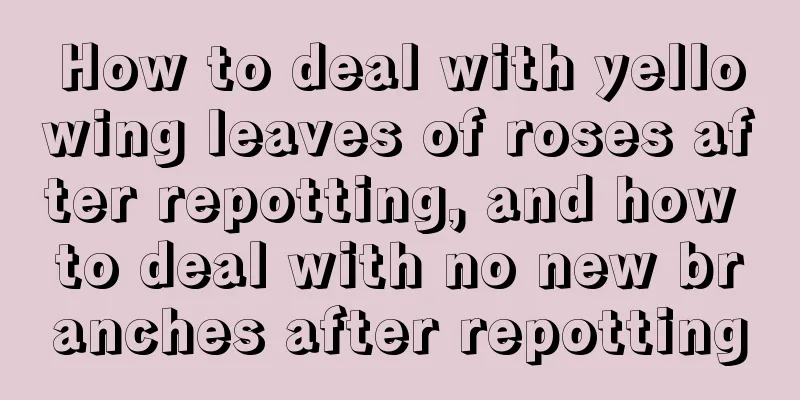How to deal with yellowing leaves of roses after repotting, and how to deal with no new branches after repotting

1. How to deal with yellowing leaves after repotting1. Not acclimatizing: After repotting, you need to give it a certain amount of time to acclimate. It is normal to have yellow leaves during this period, so don't worry too much. Just remember to spray water on the leaves frequently every day to reduce the phenomenon of yellowing leaves. 2. Unsuitable soil: The soil replaced during potting has too strong water retention. The plant is prone to root rot in such an environment, resulting in yellow leaves. Therefore, you must pay attention to soil preparation. Use half nutrient soil mixed with half river sand. This way, the soil has sufficient nutrients and good air permeability, which is conducive to growth. 3. The light is too strong: After repotting, it cannot be placed under strong light. Its absorption capacity is poor at this time. If it is exposed to the sun, it will easily become dehydrated, resulting in yellow leaves. Move it to a ventilated, cool place, and slowly increase the light after a week. 4. Damaged root system: If the root system is accidentally damaged during repotting, the leaves will easily turn yellow during the recovery period. Don't worry too much, it will slowly recover if you take good care of it for a period of time. 2. What to do if no new branches grow after repottingAfter repotting, the plant needs a certain amount of time to adjust to the new pot. During this period, yellowing leaves and wilting are normal, so don't worry too much. After the pot is warmed up, it will slowly resume growth. However, if no new branches sprout for a long time, it is recommended to remove the plant from the pot and check whether the roots are rotten. You also need to check the replaced soil and make sure it is loose and breathable. If it does not meet the requirements, you need to replace it. |
<<: Artificial cultivation of Gastrodia elata technology
>>: Eggplant high-yield pruning method
Recommend
Can asparagus fern be exposed to rain? Can it be exposed to rain on rainy days?
Asparagus fern is afraid of water but also likes ...
Seed propagation of Digitalis
Preparation for sowing and propagation of Digital...
The bougainvillea is in full bloom, so lush
Tip 1: Pruning Pruning branches (Author: Flower f...
How to repot a potted petunia
Tips for repotting petunias Petunia repotting can...
How to cultivate Euphorbia obesa
Soil requirements The soil requirements of Euphor...
How to grow a fragrant osmanthus more luxuriantly
A touch of fragrance growing conditions Yimoxiang...
How to grow cherry blossom grass
1. Soil preparation The requirements in this rega...
What should I do if Trumpet Creeper loses a lot of leaves in winter? Does it need to be pruned in winter?
1. What to do if Trumpet Creeper loses a lot of l...
How to grow peas on the balcony
Planting season: It is usually sown in March-Apri...
How to plant water chestnuts? Which month is the best to plant water chestnuts?
Suitable time for planting horseshoe Water chestn...
What is the best month to plant strawberry seedlings?
When to plant strawberry seedlings It is generall...
What should you pay attention to when raising orchids every month?
What should I pay attention to when growing orchi...
How can the dead green radish be resurrected?
1. Check the roots After the green radish is froz...
Moringa seeds benefits and effects
1. Regulate blood pressure Moringa seeds can brea...
Celery planting time and method cultivation and management technology
Celery planting time The best time to plant celer...









